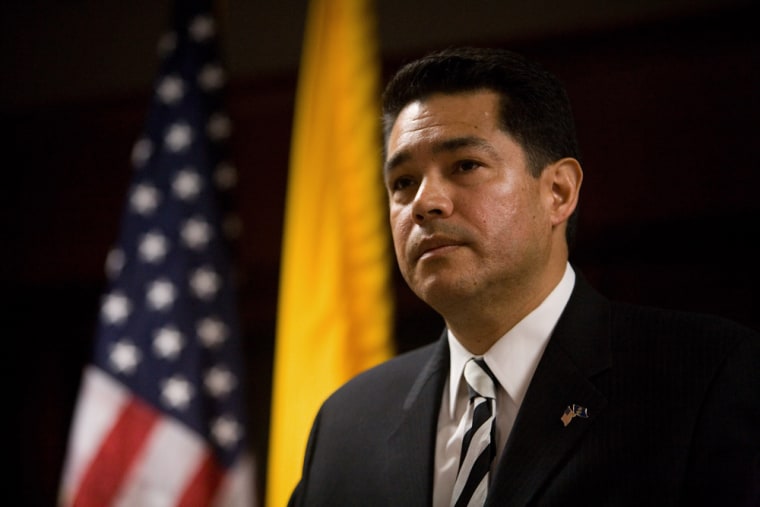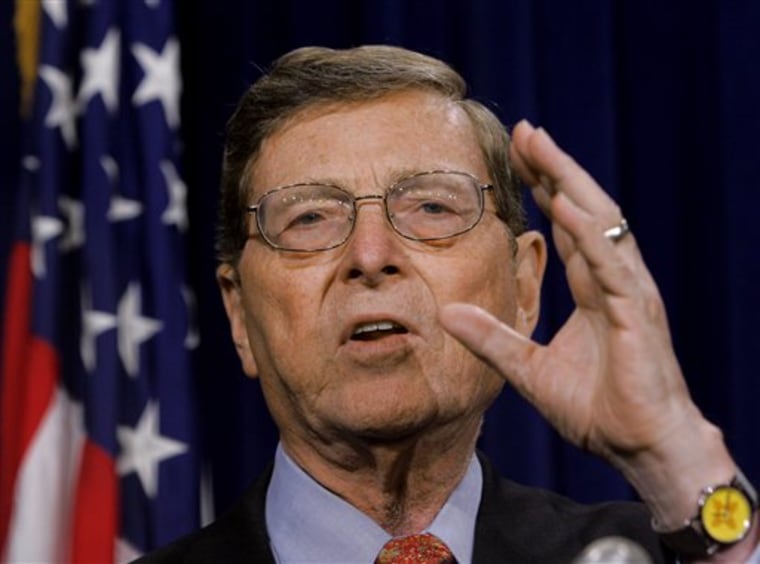A fired federal prosecutor told a Senate committee Tuesday that he felt "leaned on" and sickened as Republican Sen. Pete Domenici hung up on him in disgust last fall when told that indictments in a corruption case against Democrats would not be issued before the fall elections.
"He said, 'Are these going to be filed before November?'" former federal prosecutor David Iglesias, one of eight U.S. attorneys summarily fired in recent months, told the panel. "I said I didn't think so. And to which he replied, 'I'm very sorry to hear that.' And then the line went dead."
The Bush administration also applied a heavy hand after the firings of eight prosecutors became public and some of the dismissed U.S. attorneys had been quoted in media, according to one of those ousted, Bud Cummins of Arkansas.
Threats denied
Cummins said in an e-mail released by the Senate Judiciary Committee that Mike Elston, chief of staff to Deputy Attorney General Paul McNulty, had called and expressed his displeasure that the fired prosecutors talked to reporters about their dismissals.
"If they (DOJ) feel like any of us intend to continue to offer quotes to the press, or organize behind the scenes congressional pressure, then they feel forced to somehow pull their gloves off and offer public criticisms to defend their actions more fully," Cummins said in the e-mail to five other fired prosecutors.
The Justice Department denied that any threat, implied or otherwise, was made.
"A private and collegial conversation between Mike Elston and Bud Cummins is now somehow being twisted into a perceived threat by former disgruntled employees grandstanding before Congress," said department spokesman Brian Roehrkasse.
"Mike Elston did not tell any U.S. attorney what they should or should not say publicly about their departure," Roehrkasse added. "Any suggestion that such a conversation took place is ridiculous and not based on fact."
'I felt leaned on'
Iglesias said he received the call from Dominici at home on Oct. 26 or 27 and that it lasted two minutes, "tops."
"I felt leaned on. I felt pressured to get these matters moving," Iglesias testified.

Asked by Sen. Chuck Schumer, D-N.Y., whether such a call was unusual in Iglesias' experience, the former prosecutor answered, "Unprecedented."
Six of eight prosecutors fired by the Department of Justice in recent months were expected to appear before House and Senate panels - all six under subpoena before the House, four voluntarily in the Senate. Justice officials have said most of the eight were dismissed for performance-related issues, an allegation those testifying staunchly denied.
Cummins' e-mail also shed light on the way some of those who were fired saw the dismissals. If they voluntarily agreed to testify before Congress, "they would see that as a major escalation of the conflict meriting some kind of unspecified form of retaliation," Cummins wrote in the Feb. 20 e-mail.
Justice Department spokesman Brian Roerkasse denied that Elston ever had any conversations with the U.S. attorneys about "what they should or should not say to the press."
"No conversation like that ever happened," Roehrkasse said.
Misconduct and ethical concerns
Democrats accuse the Bush administration of firing the prosecutors to make room for Republican allies and using a new provision of the Patriot Act to install new U.S. attorneys without going through the Senate confirmation process. Attorney General Alberto Gonzales has denied that charge and said he intends to submit all of the names of his appointees to the Senate confirmation process.
At least one Republican said he isn't sure that the agency acted properly.
"If the allegations are correct, then there has been serious misconduct in what has occurred in the terminations of these United States attorneys," Sen. Arlen Specter of Pennsylvania said. He cautioned his colleagues to withhold judgment on the mass firings and the charges of cronyism leveled against the Justice Department.
But as a former district attorney in Philadelphia, he was clearly troubled by reports that two lawmakers - Domenici and Rep. Heather Wilson, both New Mexico Republicans - contacted their state's U.S. attorney about a pending case. Domenici and Wilson have acknowledged making the calls, but denied placing political pressure on prosecutor David Iglesias.
Congressional pressure?
For their parts, six former U.S. attorneys said they got little or no information about why they were fired.
Domenici had complained repeatedly to high-level Justice Department officials about New Mexico prosecutor David Iglesias, the department said. Wilson said that she, too, had spoken with Iglesias about "the slow pace" of federal corruption probes in the state.
Iglesias told the panel he received a call from Wilson about two weeks earlier, in which she asked him about sealed indictments - a topic prosecutors cannot discuss. Wilson's question "raised red flags in my head," Iglesias said.
"I was evasive and nonresponsive to her question," Iglesias told the panel, saying he talked generally about why some indictments are sealed. "She was not happy with that answer. And she said, 'Well I guess I'll have to take your word for it." The call ended almost immediately, Iglesias said.
Asked by Schumer if he felt pressured by that call, Iglesias replied: "Yes sir, I did."
Like Domenici, Wilson denied pressuring the New Mexico prosecutor. She said earlier Tuesday she had called Iglesias because she had received an allegation "by a constituent with knowledge of ongoing investigations" that he "was intentionally delaying corruption prosecutions." She said Iglesias denied that allegation, saying he simply had few people to handle corruption cases. "I told him that I would take him at his word, and I did," Wilson said.
Differences of opinion
In a joint statement ahead of Tuesday's hearings, six of the eight former prosecutors made clear that some of them had differences with the Department of Justice.
"When we had new ideas or differing opinions, we assumed that such thoughts would always be welcomed by the (Justice) department and could be freely and openly debated within the halls of that great institution," six of the attorneys said in a joint statement released ahead of the hearings.
Domenici said over the weekend that he had contacted Iglesias in October 2006 to ask about progress of the probe, though he denied putting any pressure on the prosecutor.
In her statement Tuesday, Wilson said the department dismissed Iglesias "without input from me." Her telephone call was not politically motivated, she said, and the conversation was "brief and professional."
"If the purpose of my call has somehow been misperceived, I am sorry for any confusion," Wilson said.
